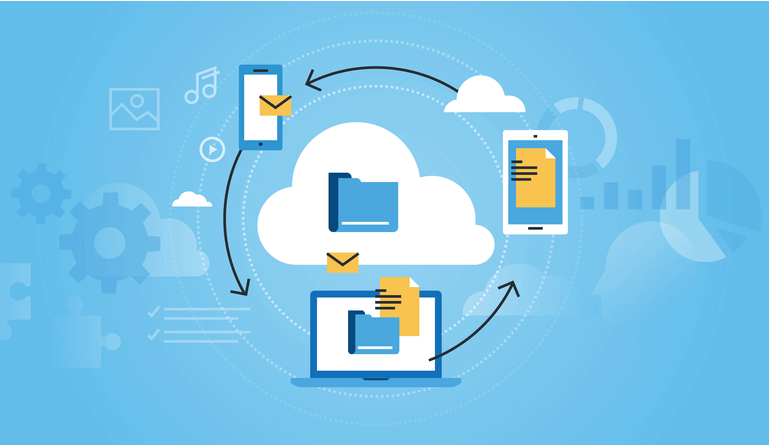Without even noticing, one is more likely to see a sales ad on their personal social media page than within more traditional forms of media. TV, print, and radio used to be the dominant platforms for businesses to reach out to a potential audience to acquire leads and gain customers. But, with the rise of digital media, companies have had to adapt to a new marketing environment. That is where cloud marketing comes into play.
What Is Cloud Marketing?
When most people today think of the word cloud, they have an idea somewhat that the term is associated with a kind of digital sharing and storing platform. Cloud marketing is just that, but it focuses more on the materials used for advertising efforts. To put an official definition to the term, cloud marketing “encompasses all of a company’s online marketing efforts. Online portals give companies new ways to present products, engage with customers, and push brand messages,” (Marketing-Schools).
Think about how companies advertise on social media platforms like Instagram and TikTok. Businesses utilize cloud marketing because they know that modern potential customers consume more content on digital platforms than more traditional ones like TV, radio, and newspapers.
Applications For Cloud Marketing
As stated earlier, cloud marketing relies on digital platforms for customer outreach. To utilize cloud marketing, businesses “market the products online and use online applications such as websites, apps, web portals, social media platforms like Facebook, Instagram, Twitter, etc.,” (LAPAAS). Think about how most people use smartphones, which they carry everywhere they go, to access social media platforms through apps. Having app-friendly ads and campaigns is crucial to gaining an audience’s attention in the digital era.
But having applications specifically used for cloud marketing can be helpful in navigating various digital platforms to create a concise customer outreach campaign.
Salesforce:
Salesforce Marketing Cloud tracks and builds customer activity and profiles. This helps businesses create, oversee, and analyze cloud marketing campaigns across various digital platforms, including the ones mentioned in the previous paragraph.
Nielson:
When one hears of the name “Nielson,” one might think of television viewership ratings. But Nielson Marketing Cloud allows for the company to utilize its data monitoring capabilities to focus on customer behavior across the web.
Oracle:
The Oracle app has marketing cloud tools that streamline consumer data online to help businesses organize a cloud marketing campaign that addresses their needs. Oracle also provides tools for different aspects of marketing on a single platform.
Adobe:
Adobe has a service called Adobe Marketing Cloud that can forecast customer behavior as it is happening. This allows businesses to adjust cloud marketing strategies and be ahead of the curve in the ever-changing world of social media.
IBM:
A well-known company known for technological innovation also has a tool for cloud marketing. IBM Interactive Marketing Solution gives businesses specialized points of outreach, for both inbound and outbound strategies, to best connect with customers.
Benefits of Cloud Marketing
Real-Time Response & Feedback: Social media posts have tools to see live audience feedback of content. With like, sharing, and comment tools, a business can know immediately if its marketing techniques are engaging to the general public.
Targeted Outreach: Social media allows for strategic targeting of digital content through tracking and analytical features. If a person was Googling “places to eat nearby”, local and franchise restaurants can send the content directly to that person based on their search history.
Adjustable: If a mistake is made or if there is a public backlash to marketing content, a company can quickly fix it and issue an apology. Problems can be dealt with as quickly as they occur.
Money-Saving: Utilizing cloud marketing strategies in favor of traditional ones can save businesses a lot of money. Although social media has paid-ad tools that businesses can use to further their reach, they can also upload regular posts for free. With platforms like tv, radio, and print, every ad costs.
Disadvantages of Cloud Marketing
Frequent Output of Content: It is known that digital content must be churned out consistently to fully engage a potential audience. Having a digital marketing campaign that is scheduled ahead of time and is organized is crucial to send a clear message.
Digital Upkeep: Remaining relevant is another aspect of social media that gets neglected by big corporations. Having a legacy name is not enough to have an audience online. A business must update its social media pages frequently to inform an audience of new products and sales.
Reading the Room: Pop culture, politics, and social events are discussed all across social media. This sometimes creates an environment where digital faux pas can go viral due to being misinformed or callous in their social media posts. Companies that have experienced controversy may experience a negative impact on their reputations and sales from not being aware of the constantly changing social etiquette online.
Who Uses Cloud Marketing?
Whether it’s a small business or a large corporation, cloud marketing is utilized across all industries. No matter what products a business sells or services that they offer, having digital strategies for online outreach is a factor in a business being able to appeal to new customers. The main goal of a business is to grow and not having a digital footprint means stagnation. More traditional means of marketing such as TV, print, and radio are still important. But as readership for magazines, viewership for television, and listeners for radio go down, businesses must adapt to a digital environment.
Cloud Marketing Plan Strategy
Creating a digital marketing campaign requires a lot of strategy and planning. A business must know who they are trying to reach out to and why. Will a product or service speak to them? A business must also find its digital voice. People like authenticity, so making witty captions might seem cool but it may come across as awkward if a relationship is not built with the audience from the ground up.
Also, a business has to calculate its marketing costs. If it is limited, could they decide to focus on one social media platform and not the other, due to cost-effectiveness and having a target audience there? Making a bang out of your buck is an efficient strategy to ensure maximum outreach without the maximum costs.
Finally, a business must put its foot in the water in order to make an impact on social media. Start out with simple posts and go from there. Watch the engagement and interaction levels of the posts. Study those who saw and responded to the content. Find out what they like and what gets their attention. Then, formulate a marketing campaign around that.
Cloud Marketing Components
Cloud marketing isn’t just for digital marketing campaigns. “Marketing Cloud includes integrated solutions for customer journey management, email, mobile, social, web personalization, advertising, content creation and management, and data analysis,” (Salesforce). A business can find a specific need within its digital campaign strategy and utilize many of these components to bridge gaps.
Frequently Asked Questions about Cloud Marketing
Q. How Does Cloud Marketing Help Companies Become “Customer Companies”?
A. “Engage customers with the right message at the right time and on the right channel, resulting in deeper, more meaningful relationships,” (Salesforce). This means creating the right post, sharing it on the right platform, at the right time can make or break the success of a digital marketing campaign.
Q. How Does Cloud Marketing Help Marketers Oversee Customer Journeys?
A. By overseeing and analyzing customers on company-verified platforms, businesses can watch in real-time how they move, what they click, and what they buy, while on a platform.
Q. What Channels Can Be Used to Reach Customers with Cloud Marketing?
A. Cloud Marketing “provides a single location for all cross-channel content, enabling brands to speak with one voice and deliver a consistent experience,” (Salesforce).
Q. What Is Cloud Marketing’s Relationship with Major Social Media Networks?
A. By being in collaboration with every popular social media network online, cloud marketing can take advantage of trying out pre-launch tools, gaining exclusive data insights, being in the know on changes within the social media realm.
Q. How Does Cloud Marketing Utilize Customer Information to Increase Effectiveness of Digital Advertising?
A. Businesses can “reach customers on any device or channel with identity-based targeting via Twitter, Facebook, LinkedIn, and Instagram,” (Salesforce).
Final Thoughts
Utilizing Cloud Marketing can modernize a business’ outreach campaigns to entice new customers. A brand-new business must come out of the gate with a digital marketing strategy in order to make a name for itself. But a legacy company might be slow to adopt digital strategies due to cemented reputations and having iconic products.
However, in order to remain relevant and survive the ever-changing world of digital marketing, businesses of all sizes must be adaptable and willing to know an audience on a more social level.





